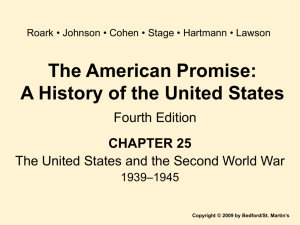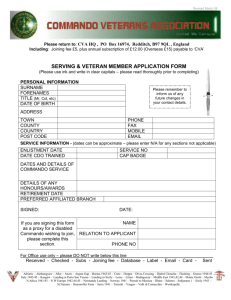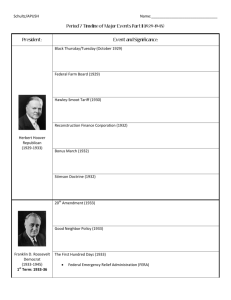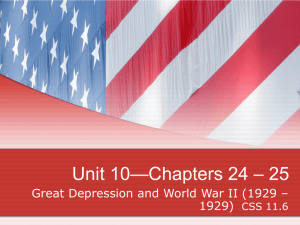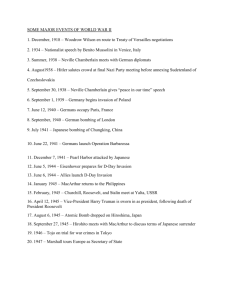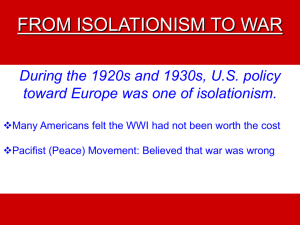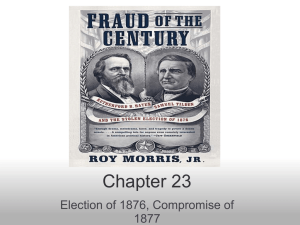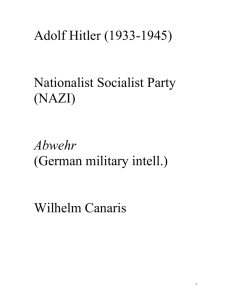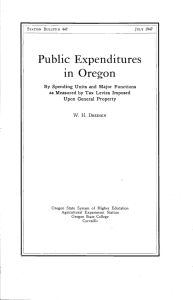Name Date Period Period 7 (1890-1945) Timeline of Major Events
advertisement
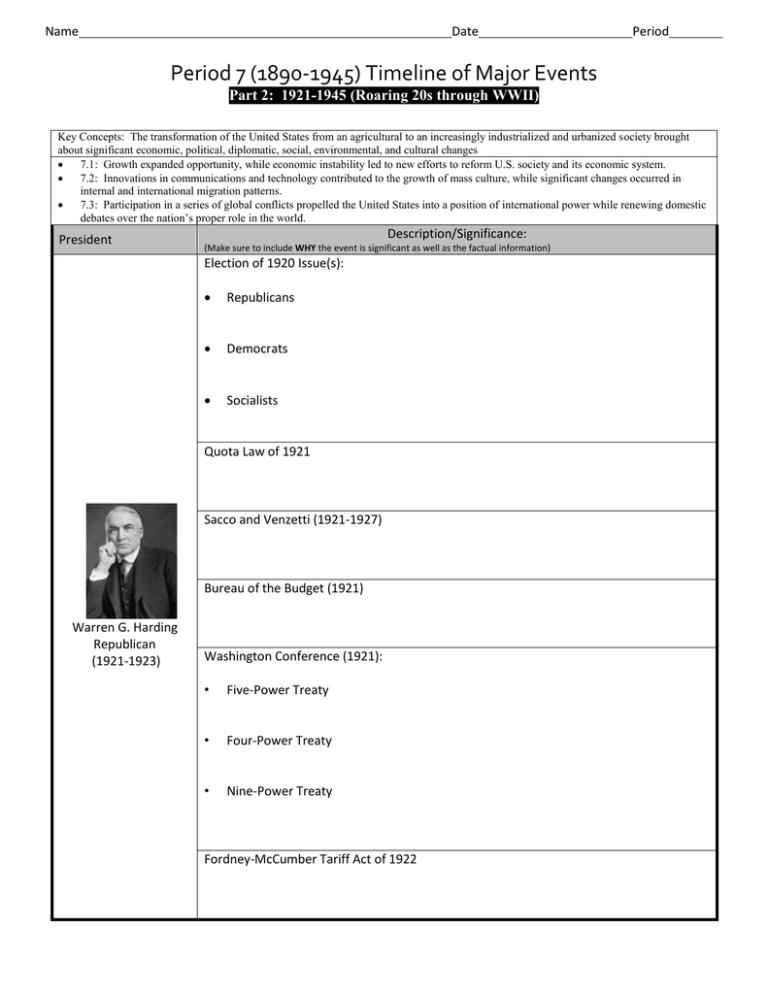
Name Date Period Period 7 (1890-1945) Timeline of Major Events Part 2: 1921-1945 (Roaring 20s through WWII) Key Concepts: The transformation of the United States from an agricultural to an increasingly industrialized and urbanized society brought about significant economic, political, diplomatic, social, environmental, and cultural changes 7.1: Growth expanded opportunity, while economic instability led to new efforts to reform U.S. society and its economic system. 7.2: Innovations in communications and technology contributed to the growth of mass culture, while significant changes occurred in internal and international migration patterns. 7.3: Participation in a series of global conflicts propelled the United States into a position of international power while renewing domestic debates over the nation’s proper role in the world. President Description/Significance: (Make sure to include WHY the event is significant as well as the factual information) Election of 1920 Issue(s): Republicans Democrats Socialists Quota Law of 1921 Sacco and Venzetti (1921-1927) Bureau of the Budget (1921) Warren G. Harding Republican (1921-1923) Washington Conference (1921): • Five-Power Treaty • Four-Power Treaty • Nine-Power Treaty Fordney-McCumber Tariff Act of 1922 Teapot Dome Scandal (1921-1924) Extra Notes/Info on Warren G. Harding: Election of 1924 Issue(s): Republicans Democrats Progressives Quota Law of 1924 Calvin Coolidge Republican (1923-1929) Dawes Plan (1924) Scopes Monkey Trial (1925) Kellogg-Briand Pact (1928) Extra Notes/Info on Calvin Coolidge: Election of 1928 Issue(s): Republicans Democrats Black Thursday (October 1929) Herbert Hoover Republican (1929-1933) Black Tuesday (October 1929) Federal Farm Board (1929) Hawley-Smoot Tariff (1930) Reconstruction Finance Corporation (1932) Bonus March (1932) Extra Notes/Info on Herbert Hoover: Election of 1932 Issue(s): • Republicans • Democrats 20th Amendment (1933) Good Neighbor Policy (1933) The First Hundred Days (1933): Franklin D. Roosevelt Democrat (1933-1945) 1st Term: 1933-37 • Federal Emergency Relief Administration (FERA) • Agricultural Adjustment Administration (AAA) • Civilian Conservation Corps (CCC) • National Recovery Administration (NRA) • Public Works Administration (PWA) • Tennessee Valley Authority (TVA) Other First New Deal Programs (1933-1934) • Civil Works Administration (CWA) • Securities and Exchange Commission (SEC) • Federal Housing Administration (FHA) Works Progress Administration (1933-1940): National Youth Administration (NYA) American Liberty League (1934) Tydings-McDuffie Act (1934) Indian Reorganization Act or Wheeler-Howard Act (1934) Resettlement Administration (1935) Wagner Act (1935) Rural Electrification Administration (1935) Social Security Act (1935) Huey Long: • “Share Our Wealth” Program • Election of 1935 Committee/Congress of Industrial Organizations (1935) Supreme Court abolishes the NRA and the AAA (1935-36) • Schechter Poultry Corp v. United States • United States v. Butler Soil Conservation Service (1935) Neutrality Act of 1935 Neutrality Act of 1936 Election of 1936 Issue(s): • Republicans • Democrats Neutrality Act of 1937 Judicial Reorganization Bill (1937) Franklin D. Roosevelt Democrat (1933-1945) 2nd Term: 1937-41 United Auto Workers Union (1937) Quarantine Speech (1937) The Grapes of Wrath (1939) Invasion of Poland (September 1, 1939) “Cash and Carry” (1939) Blitzkrieg (1940) America First Committee (1940) Selective Service Act (1940) Election of 1940 Issue(s): • Republicans • Democrats Fair Employment Practice Committee (1941) Four Freedoms Speech (1941) Lend-Lease Act (1941) Franklin D. Roosevelt Democrat (1933-1945) 3rd Term: 1941-45 & 4th Term: 1945 Atlantic Charter (1941) US Oil Embargo with Japan (1941) Pearl Harbor (December 7, 1941) US Declaration of War (December 8, 1941) War Production Board (1942) Operation Torch (1942) Office of Price Administration (1941) Office of Research and Development (1941) • Manhattan Project Office of War Information (1942) Office of War Mobilization (1943) Smith-Connally Anti-Strike Act of 1943 Casablanca Conference (1943) Teheran Conference (1943) Double ‘V’ Slogan (1943) Congress of Racial Equality (1942) Battle of Midway (June 4-7, 1942) Smith v. Allwright (1944) Bracero Program Zoot Suit Riots (1943) Korematsu v. United States and Japanese Internment (1942-1944) D-Day (June 6, 1944) Yalta Conference (1945) Extra Notes/Info on Franklin D. Roosevelt: German Surrender (May 7, 1945) Hiroshima and Nagasaki (August 1945) Japanese Surrender (September 2, 1945) Harry S. Truman Democrat (1945-1953) Potsdam Conference (1945) United Nations (1945) Terms to Know Standard of living Voluntarism Assembly line Appeasement Consumerism Speculation Consumer culture Overproduction Art deco Underconsumption Harlem renaissance Buying on margin Modernism Tariff Fundamentalism Capital Revivalists Credit Disarmament Stock market crash Reparations
